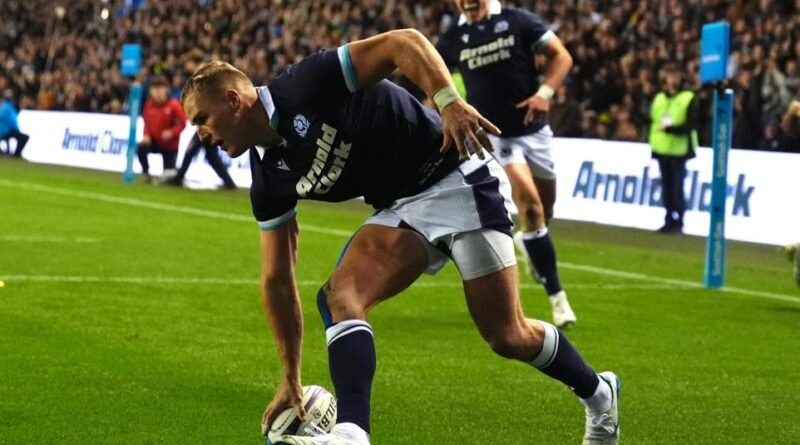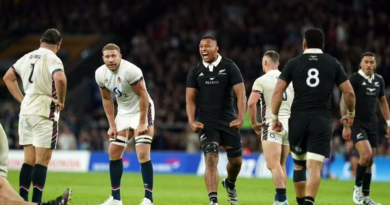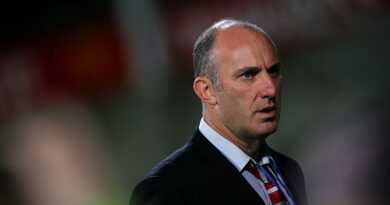You Might Not Like It, But Scotland Must Continue Importing Players
For reasons I don’t really want to go into I ended up watching the Scotland v Fiji match in a pub in Edinburgh.
An England fan was sitting near us, easily identified by his England shirt and his disappointed expression when the All Blacks scored a late try to win at Twickenham. He wasn’t the type of England supporter who backs Scotland when they’re not playing England, either. His frustration grew as Scotland scored try after try to beat Fiji—a result I didn’t expect.
The fan really lost his temper when Duhan van der Merwe crossed the line to become Scotland’s leading try scorer. He loudly called Scotland “cheats” for playing Van der Merwe, since he was originally from South Africa. In the past, I might have gotten into a heated argument with him, but instead, I calmly pointed out: “Billy Vunipola! Mako Vunipola! Manu Tuilagi!”
All three of these players, like Van der Merwe, are eligible to play for their adopted countries because of residency rules. After that, the English fan didn’t say another word.
This exchange made me think about what would happen if national coaches could only pick players who were born and based in their own country. The truth is, all major rugby nations have selected players who were born elsewhere. The eligibility rules state that players can qualify either through family connections (up to grandparents) or by living in the country for five consecutive years or ten years cumulatively.
Some people don’t like that Scotland relies on players from outside the country, but look at the contributions of players like WP Nel, Pierre Schoeman, Jack Dempsey, Sean Maitland, and Van der Merwe. The latest “import” to be capped is Tom Jordan, a New Zealander who plays for Glasgow Warriors and had an impressive debut against Fiji. Jordan even made the TNT Sports Team of the Week, with an all-Scottish back line. If Saturday’s performance is anything to go by, he’s one to watch for the future.
Scotland simply doesn’t have the same depth of player resources as other countries, and we need these “imports.” Would we have beaten Fiji without them? Maybe, but it’s hard to say for sure.
Fiji was missing key players who play in Europe, like former captain Waisea Nayacalevu (Sale Sharks) and stars like Josua Tuisova (Racing 92) and Semi Radradra (Lyon), but head coach Mick Byrne didn’t complain. In fact, 17 players from his squad had just played in Fiji’s big win at the Pacific Nations Cup in September.
Scotland, too, was missing some key players like Finn Russell, Ben White, and Blair Kinghorn, who I think would have started against Fiji and will likely feature against South Africa.
The Springboks will be a much tougher challenge than Fiji, but Glasgow Warriors showed last season that Scottish teams can do well in South Africa, and home advantage at Murrayfield could give Scotland a boost. The crowd certainly played a part in Scotland’s dominant performance against Fiji, which seemed to surprise the Fijians.
Scotland was superior in almost every area, though Fiji did manage three tries. Against South Africa, Scotland will need to limit mistakes and discipline issues, as the Springboks will capitalize on any errors.
Unfortunately, Scotland will be without Darcy Graham for the upcoming match due to a head injury. After his incredible four-try performance against Fiji, he’ll be a big loss, but Scotland’s depth means they can still cope.
The Springboks aren’t unbeatable, but they are incredibly tough. We can only hope they have an off day and that every Scottish player brings their best game to Murrayfield.
Lastly, some local news: There’s an important election coming up—not the national one, but for the new Vice-President of the SRU. Tomorrow (Thursday) night, candidates John Brown and Hazel Swankie will present their cases to the Glasgow North clubs at Scotstoun Stadium. The meeting is open to all clubs in the Glasgow area, including women’s sections. It starts at 7pm, and I hope as many clubs as possible attend, as this is an important election for the SRU.




“The truth is, all major rugby nations have selected players who were born elsewhere.”
This happens very seldom with the Springbok – the only ones, I can remember are Tendai Mtawarira (born in Zimbabwe, moved to SA as an 18 year old) and Percy Montgomery (born in Nambia but was schooled in South Africa). However, there are a truckload of South African born players playing for other international teams
You make a good point about South African-born players playing for other nations, and it’s true there are a few examples like Elliot Daly and Juan de Jongh. However, Scotland’s situation is different. With a smaller talent pool, they rely on players qualifying through residency, such as WP Nel and Duhan van der Merwe, to remain competitive at the highest level. While South Africa doesn’t often select foreign-born players, smaller nations like Scotland need to make the most of available resources. Bringing in experienced players helps them stay competitive in a sport with greater financial and development disparities
For the record, I have no problem with players using any opportunity to further their careers, even if it means playing for a country they were not born into. In the professional era, playing rugby is a career, albeit a short one, and players must “make hay while the sun shines”. Also, I think that diversity in the playing pool improves the game in general and leads to better competition between teams.
I completely agree! In the professional era, players need to make the most of their careers, and a diverse pool of talent certainly enhances the competition and overall quality of the game. It’s all about finding the right balance.
>>> “Elliot Daly and Juan de Jongh” ???
Not sure where you are getting your info from but both these players have only ever played internationally for the same countries they were born in !! Elliot Daly was born in Croydon, England and plays for England and Juan de Jongh was born in Paarl, South Africa and played for the Springboks.
You’re absolutely right! Apologies for the confusion. Elliot Daly has always represented England, and Juan de Jongh has only played for South Africa. Thanks for pointing that out!